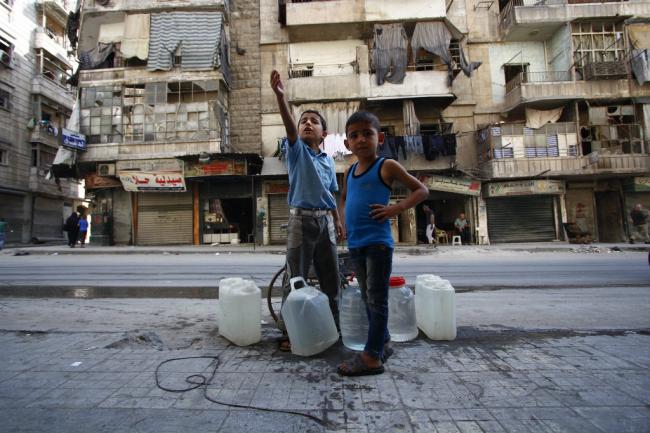
Millions of children in crisis zones face 'bleak future,' UNICEF warns, launching emergency appeal
New York, Jan 31 (JEN): Children are the most vulnerable when conflict or disaster causes the collapse of essential services such as healthcare and unless the international community takes urgent action to protect and provide life-saving assistance to them, “they face an increasingly bleak future,” the United Nations Children's Fund (UNICEF) warned Tuesday, launching a $3.6 billion emergency appeal.
According to UNICEF, approximately 48 million children across 51 countries are caught up in war zones, natural disasters and other dire emergencies that continue to deepen in complexity, bringing new waves of violence, displacement and disruption into their lives.
“Children cannot wait for wars to be brought to an end, with crises threatening the immediate survival and long term future of children and young people on a catastrophic scale,” said UNICEF's Director of Emergency Programmes, Manuel Fontaine, citing the devastating impact on children living amid years-long or cyclical violence in countries like the Democratic Republic of Congo, Iraq, Nigeria, South Sudan, Syria and Yemen, among others
UNICEF said that almost one in four children live in a country affected by conflict or disaster and has therefore set aside about 84 per cent of its appeal (over $3 billion) these zones.
Destruction of schools, hospitals and health and sanitation systems due to violence has meant that the spread of water-borne diseases is now one of the greatest threats to children's lives in crises.
Girls and women face additional threats, as they often fulfil the role of collecting water for their families in dangerous situations.
“[Some] 117 million people living through emergencies lack access to safe water and in many countries affected by conflict, more children die from diseases caused by unclean water and poor sanitation than from direct violence,” said Mr. Fontaine.
The largest chunk of UNICEF's 2018 appeal, amounting to $1.3 billion is earmarked for supporting nearly seven million Syrian children both inside the war-torn country – where the conflict will soon enter its eight year – as well as those forced to become refugees outside its borders.“Without access to safe water and sanitation, children fall ill, and are often unable to be treated as hospitals and health centres either do not function or are overcrowded. The threat is even greater as millions of children face life-threatening levels of malnutrition, making them more susceptible to water-borne diseases like cholera, creating a vicious cycle of undernutrition and disease,” he added
Globally, the UN agency aims to reach 35.7 million people with access to safe water, 8.9 million children with formal or non-formal basic education, 10 million children with immunization against measles, 3.9 million children with psychosocial support, and 4.2 million children with treatment for severe acute malnutrition.
As the leading humanitarian agency on water, sanitation and hygiene in emergencies, UNICEF provided over half of the emergency water, sanitation and hygiene services in humanitarian crises around the world. It also helped hospitals and medical centres treat deadly diseases and repaired water and sanitation systems.
In the first 10 months of 2017, UNICEF provided almost 30 million people with access to safe water, 13.6 million children with vaccination against measles, 5.5 million children with some form of education, 2.5 million children with treatment for severe acute malnutrition and 2.8 million children with psycho-social support.
Support Our Journalism
We cannot do without you.. your contribution supports unbiased journalism
IBNS is not driven by any ism- not wokeism, not racism, not skewed secularism, not hyper right-wing or left liberal ideals, nor by any hardline religious beliefs or hyper nationalism. We want to serve you good old objective news, as they are. We do not judge or preach. We let people decide for themselves. We only try to present factual and well-sourced news.







